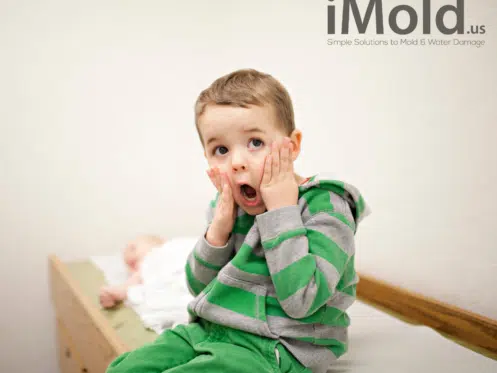There are many cases in which a child’s symptoms reflect those of a harsh health condition. However, the culprit ends up being mold toxicity. Children can have a significant impact on mold exposure that mimics other illnesses. A cough, a sneeze, or even ADD, can be a misdiagnosis, and the mold exposure continues to cause harm to the child.
Mold’s harm to human health has been increasing in the news lately. What once was a mystery, is now under continual research. It can be challenging to decipher if a condition is mold-related or not. Many mold exposure symptoms overlap with illnesses as simple as hay fever. However, if you know or suspect mold is present in your home, and your child is ill, it’s time for action.
What Is Mold And How Mold Affects Humans
Mold is a fungus that breeds and travels via microscopic spores. These spores can attach to clothing, air particles, and more, meaning they spread quickly! If you have mold in one room, it isn’t long before it affects the entire house. The mold spores can be released into the air and change your air quality as well. The effects of mold exposure can cause some severe health reactions.
When mold is present, it affects individuals differently. This difference in reaction is due to individualized immune systems. Everybody is different. When a person is sensitive or allergic to mold, their reaction will be much greater. The reaction is similar in those with weakened immune systems. These individuals are typically the elderly or chronically ill. Individuals with newer, underdeveloped immune systems, and children are also at higher risk. For further reading on whether mold can affect you, read “I’m Healthy, Will Mold and Mildew In Fort Myers Affect Me?”
When mold touches the skin or lungs, a histamine response begins in the body. This allergy-fighting reaction is a defense line for your immune system. The symptoms of this reaction can also be unpleasant. Symptoms such as sneezing, coughing, itchy skin, or eyes. While you may see this in your child and assume pollen, mold could be causing a severe reaction in your little one. When our homes are in the Southwestern Florida climate, the risk for mold intensifies. iMold is here to help you protect yourself, your home, and your children!
What other effects does mold have on children? Let’s find out!
Respiratory And Allergy Symptoms
Many studies have found respiratory distress correlated to mold exposure in kids. When a child inhales the mold spores, it irritates the lining of the lungs and causes a reaction. The reactions typically mimic those seen in seasonal allergies.
- Shortness Of Breath
- Coughing
- Sneezing
- Wheezing
- Sore Throat
- Nasal Congestion
- Itchy/ Runny Nose
- Sore Throat
A child with a respiratory illness, such as Asthma, or mold will exacerbate the condition. Flare-ups of these conditions are also common.
The greatest risk comes with the toxic black mold, Stachybotrys chartarum. While many species of molds carry great danger, the infamous toxic black mold is the most severe. Particularly in children’s immune-suppressed systems, toxic black mold can become deadly. Toxic black mold can cause hemorrhagic pneumonia. This pneumonia causes bleeding of the lung tissue. It is always best to have a professional inspection and removal if you believe mold is present.
Neurological Symptoms
Stachybotrys Chartarum exposure to children can cause some significant neurological effects. Mycotoxins release from the mold and travel on the spores. These toxins can cause kill or damage neurons, impairing brain function. Mood swings, irritability, and nervous disorders can all result from mycotoxin presence. Other common neurological symptoms from toxic black mold are:
- Dizziness
- Headaches
- Disorientation
- Shortened Attention Span
- Memory loss / Memory problems
- Numbness
- Anxiety
- Depression
- Shaking / Trembling / Tremors
- Slow Reflexes
- Hallucinations
- Cognitive Dysfunction
- Confusion / Disorientation
Skin Irritations
Skin irritations can be one of the first tell-tale signs that mold exposure is occurring. Mold spores irritate the skin easily, sometimes as simple as eczema flare-ups. Mold can cause skin irritations, such as:
- Eczema or flare-ups of existing eczema
- Flare-ups of existing skin conditions
- Dry, scaly skin
- Itchy skin
- Redness and swelling (Dermatitis)
Other Mold Allergy Symptoms
Mold exposure can cause a multitude of health-related illnesses in children.
- Bloodshot Eyes
- Itchy / Red Eyes
- Watery Eyes
- Blurred Vision
- Swollen Eyelids
- Eye Soreness
- Nausea
- Vomiting
- Diarrhea
- Hair Loss
- Chronic Ear Infections
- Chronic weakness or fatigue
- Reoccurring Colds and Flu-Like Symptoms
- Aches such as muscle pain, joint pain, abdominal pain, or chest pain
The severity and length of exposure time determine symptoms in individuals. Each child will react differently to a mold allergy. The longer the mold is present, the worse the symptoms become. The longer the exposure also means the longer the mold has had to grow and breed. It is best to take immediate action on mold as the first step to protect your child from adverse effects.
What To Do About Mold
The answer is simple- Bring in a professional. If you believe your child shows mold exposure, or symptoms call your pediatrician immediately. Then call iMold. Our professionally trained and certified technicians will assess your home for mold. Once a remediation and removal plan is in place, our team will get to work. Sealing off affected areas protects your home from airborne spores during the removal.
Before removal, a professional mold inspection may be necessary. Contact our office to discuss your individual mold needs. Our staff will help determine the best course of action.
After the mold removal and/or remediation process, you should start to notice a change in your child. The symptoms related to mold exposure will gradually decrease over time. While some symptoms will be gone almost immediately, other symptoms may linger. Some severe symptoms may have permanent damage. Depending on the severity of the exposure, a physician may need to keep checking your child. Be sure to follow any advice given by your child’s physician.
If you are in Southwest Florida and need mold removal assistance- call iMold today! Follow us on social media for up to date news in the area, and ongoing promotions on our Facebook, Instagram, and Twitter

